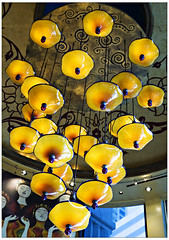Orange you glad you read about this story?
In Italian town, civics lesson from annual orange battles - International Herald Tribune :
IVREA, Italy: For the uninitiated, the annual orange battles of Ivrea in northern Italy are a lesson in both physics — the impact of the thrown fruit as it hits the flesh — and the history of this medieval town and its need to act out a legendary tale of civic rebellion in such a bruising fashion.
(Slideshow of the 2007 festival, plus some older photos of the festival, and some Flickr photos)
“It's a bit masochistic,” admitted Elisabetta Dottelli, 20, an Ivrea native and a member of one of the participating teams, during a short lull in fighting at Piazza P. Ottinetti, one of five major battlegrounds. She was referring to the Historic Carnival of Ivrea, the three-day orange-throwing festival set here to mark the celebration before Lent.Within moments, fighting would resume and the sky above would be filled, yet again, with a hailstorm of oranges.
...
The carnival is a bizarre and messy affair and, like most everything in Italy, has a long story behind it. One version has it that feudal lords gave pots of beans to the poor, who began throwing the beans back into the streets out of disrespect for such meager charity.But a far more interesting account tells of a population incited to rebellion by the violent act of a woman who, as the yarn goes, was only protecting her honor. That woman was Violetta, a young commoner who presented the head of the local tyrant — Marquis Raineri de Biandrate — to her fellow citizens from the castle balcony after he tried to steal her virginity on the eve of her wedding.
This practice of noblemen claiming a right to enjoy a betrothed woman before her husband did was certainly not exclusive to this place. But it is said to have been exercised quite regularly by that marquis, much to the chagrin of the women and their families. The citizens, empowered by Violetta's defiance, stormed the castle and burned it to the ground.
The carnival is rich in costumes, music and symbolism. The oranges of the Ivrea battles represent the head of the marquis. The pulp and juice are his blood.
“It's a festival that represents the people against any type of oppressive power,” said Roberto Vola, 43, as he tried to speak over the roll of kettle-drums and the blare of techno music.
...
Indeed, hundreds of women defied the Italian stereotype of the image-conscious beauty and showed their willingness to mix it up at an event that seemed more akin to pledging a fraternity.“Our mothers were a bit more closed, like all the rest of the women in the world,” Dottelli said. “But slowly we realized we could do all the things boys could do. The boys are better” at attacking, she said, “but they are also a bit foolish.”
The orange battle structure breaks down like this: representing the rebellious citizenry, there are thousands of “throwers,” who are divided into teams and who patrol their designated turfs — one of the five battleground piazzas. They are armed with endless crates of Sicilian and Calabrian oranges, and their aim is to wage repeated battles with any of the horse-drawn carts that pull into their respective piazzas.
Inside each cart, there are six people designated as castle defenders, outfitted in helmets and pads. The defenders volunteer for the role and sometimes serve on one side one year and the other side another. The horses are not supposed to be targets, but they are hardly safe.
“If you are born here it's in your heart, and I will do it for as long as my body allows it,” said Mario Bianchi, 55, a defender with the Ace of Spades team.
Bianchi's appearance suggested that his state of being was already precarious: his forehead had been sliced open and blood dripped down his face, mixing with the pulp of a blood orange.
Three years ago, Bianchi said, he was forced to have eye surgery after receiving a direct hit.
At the end of the carnival, awards are handed out to the top performing teams by judges who patrol the piazzas and the defenders themselves. But as many participants said during the day, while there is pride in winning, what this is really about is the celebration.
At dusk, as the fighting slowly ebbed, and visitors and participants alike trudged away through the pulpy mass that covered the streets, to eat or rest up for the next day.
As Bianchi, the defender, explained it: “It's not violent, but it is a way to release your own inner violence. You come out here and you get it all out, and for next three months you're fine.”
(link via the proto-blogger, Chuck Shepherd, on his fancy-schmancy new daily email digest.)

